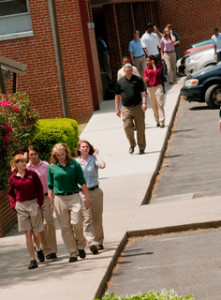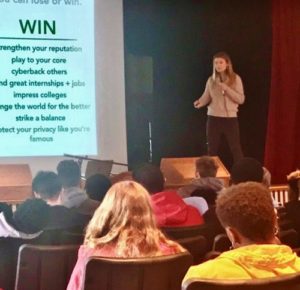The topic of cell phone use in admission conversations is nearly as pervasive as cell phones themselves! The importance and impact of cell phone and social media use by teens (and adults) cannot be overstated. In our continuing series about the structured boarding school environment offered by Oak Hill Academy, our Director of Student Affairs, Mr. Aaron Butt, explains our cell phone policy in detail, the ideas behind it, and what we are doing to promote appropriate phone use.
Our students were born into a world defined by technology. The oldest of our current students were seven years old when the first iPhone was released. For most, cell phones have been a part of their lives since before they can remember. Children, on average, receive smartphones at the age of 10.3 years. Phones, and all they can do, are a reality of our students’ lives. 
As educators, parents, and cell phone users ourselves, we know that there are sizable dangers. In fact, a recent New York Times article notes that even the Silicon Valley developers of smartphone technology are wary of what they are creating. We know that a lot of our students have struggled with misuse of their phones: overuse, setting boundaries, and a whole host of other issues that can have negative effects on virtually every aspect of their development. We also know that our job is to prepare them for the world beyond Oak Hill, where cell phones have become a ubiquitous and integral part of life.
So–what can we do as a small, structured college prep boarding school when it comes to encouraging healthy cell phone behavior? First, we try to remain true to our values. We are a school that values face-to-face interactions and dialogue. We also try to foster personal growth by teaching time management, how to build routines, and how to set boundaries. Second, we as a school must be willing to change, grow, and adapt along with our students. How do we teach effective, appropriate technology usage? How do we teach moderation?
Our current policy is based on four components: the need to disconnect and invest; establishing pockets of appropriate use; tying access to responsibility and age; and education.
Disconnect and invest:
All students begin the year without their phones for four weeks. Everyone is in the same boat – new and returning students – and we believe this allows students to make deeper connections to their peers and to invest in our community right from the outset.
Pockets of appropriate use:
We value the ability to unplug and put our phones away. All students have their phones on the weekends, Friday through Sunday. They collect their phones from the resident managers after class on Friday, and turn them in before bedtime that night. On Saturday and Sunday they collect their phones in the morning, and again turn them in before bed. Students never have their phones during our Quiet Time (study hall), and never have them overnight.
Tying access to responsibility and age:
 Students who have proven that they are responsible, and have met certain academic and behavioral expectations, receive additional phone time. The criteria are based on the number of behavioral infractions, academic performance, homework completion, getting to class on time, and other factors. Seniors who have met the criteria will receive their phones on Wednesdays and Thursdays, from after school until Quiet Time. Juniors and sophomores will receive them on Thursdays. Eighth and ninth grade students follow the standard phone schedule, with no additional time, as it is developmentally appropriate for younger students to have less access.
Students who have proven that they are responsible, and have met certain academic and behavioral expectations, receive additional phone time. The criteria are based on the number of behavioral infractions, academic performance, homework completion, getting to class on time, and other factors. Seniors who have met the criteria will receive their phones on Wednesdays and Thursdays, from after school until Quiet Time. Juniors and sophomores will receive them on Thursdays. Eighth and ninth grade students follow the standard phone schedule, with no additional time, as it is developmentally appropriate for younger students to have less access.
Education:
We teach best practices in technology usage through our Resident Life curriculum, advisory curriculum, and other instruction. We discuss positive usage, addiction, online bullying and inappropriate sharing, and how to use social media for good. We review case studies and work through various scenarios. Last year, we invited an organization called The Social Institute to campus to lead student discussions and conduct staff professional development and parent seminars.

In short, Oak Hill Academy tries really hard to balance staying true to our mission with addressing the world’s current realities. And one of the realities of today is that things are continually changing. The above is our current policy, but we are constantly reevaluating and making adjustments.
What will remain true is that our students will always need routines, structures, boundaries, and accountability. They will always need adults to model good behavior and good practices. They will always need supportive parents, teachers, peers, coaches, resident managers– a team around them to challenge and encourage them. Cell phones are part of our lives today, and while we don’t know what new issues are on the horizon, we’ll be here to guide our students through them.
Aaron Butt
OHA Director of Student Affairs
